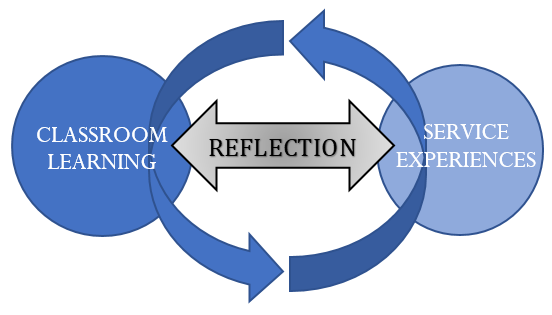Service-Learning in the Christian School
Service-learning is a teaching strategy that connects classroom learning with meaningful, authentic service in the community.
 Christian school leaders and teachers are committed to developing a biblical worldview in their students. It is not uncommon for the phrase biblical worldview to be splashed across Christian school websites, embedded in mission statements, and featured prominently in expected student outcomes. This is largely a result of the emphasis on biblical worldview in the broader evangelical world over the last three decades. Books and curricula have been written, conferences have been created, and Christian high schools and universities have added required courses in biblical worldview—all effective and powerful ways to pass on the content of a biblical worldview to the emerging generation.
Christian school leaders and teachers are committed to developing a biblical worldview in their students. It is not uncommon for the phrase biblical worldview to be splashed across Christian school websites, embedded in mission statements, and featured prominently in expected student outcomes. This is largely a result of the emphasis on biblical worldview in the broader evangelical world over the last three decades. Books and curricula have been written, conferences have been created, and Christian high schools and universities have added required courses in biblical worldview—all effective and powerful ways to pass on the content of a biblical worldview to the emerging generation.
However, even with all this emphasis, relatively little attention has been given to the implications of a biblical worldview on pedagogy. Certainly, biblical worldview ought to inform how we teach, and not just what we teach. Several years ago, I asked a worldview expert how he thought a biblical worldview should impact how I teach. Unfortunately, not only did he not answer my question, he didn’t seem to get what I was asking—almost as if he hadn’t really thought about the concept before. It is easy to overlook the fact that biblical worldview is not just a matter of selecting or designing curriculum. Even the way in which we teach can (and should) be intentionally leveraged to develop students’ worldview.
Not long after this encounter, a colleague introduced me to service-learning, a pedagogy seen in public K–12 schools and higher education but almost unheard of in Christian schools. The more I looked at service-learning, the more I recognized the potential it has to be a pedagogy that naturally flows out of—and powerfully reinforces—a biblical worldview.
What Is Service-Learning?
Service-learning is a teaching strategy that connects classroom learning with meaningful, authentic service in the community. Students learn and practice content, skills, or dispositions in the classroom and then go out to apply those learning objectives in the context of a service project that meets legitimate needs of others. For example, an upper elementary teacher can help students learn about graphing by having students work with a church food pantry to take inventory, procure food items, and track distribution at outreaches. Or, a high school economics teacher might work to deepen students’ understanding of the needs of retirees by having students develop relationships and conduct interviews with residents at a senior citizen center over a course of a year.
While the possibilities for specific projects are limitless, it’s easy to see how much more impactful learning would be if teachers harnessed the academic content to get students out into the community, interacting with real people who could actually benefit from students’ learning. Linking academic concepts with service gives “hands and feet” to what students learn in the classroom. And reflection—whether through journaling, class discussion, or other measures—is “a vital and ongoing process in service-learning that integrates learning and experience with personal growth and awareness” (Kaye 2004, 11). Thus service-learning is essentially a repeating cycle of classroom learning and service experiences, mediated by reflection.

The Positive Impact of Service-Learning
The potential of service-learning to positively impact student learning is well-attested in the literature. Research suggests that service-learning can positively affect students’ academic achievement (Berson and Younkin 1998; Astin, Sax, and Avalos 1999); promote healthy civic engagement (Eyler and Giles 1999; Myers-Lipton 1998); nurture the development of beliefs and values (Radecke 2007; Furco and Root 2010); and foster leadership, spiritual, and personal development (Furco and Root 2010; Carver 1997; Felten and Clayton 2011). All these outcomes are consistent with a biblical worldview, and while none of the research cited above was conducted in Christian settings, it’s not much of a stretch to conclude that service-learning in Christian schools would elicit many of the same results.
Service-Learning and the Christian Educator
For the Christian educator, service-learning holds even more promise as it is consistent with how Jesus Himself taught. Jesus’ disciples were highly engaged in their learning, often immediately applying what they were learning by meeting the real-world needs of people, and then later reflecting with Jesus about what they experienced and can learn. One such example is the feeding of the 5,000, and later the 4,000, where Jesus amplified His teaching agenda with his disciples by having them directly involved in the miraculous provision of food for an enormous crowd. Just a few chapters later in Matthew, we see Jesus sitting with His team, unpacking and interpreting what they experienced through guided reflection. While direct parallels to the life and teaching of Christ shouldn’t be forced for each facet of service-learning, few would argue that Jesus did not heavily rely on firsthand experience in loving and serving others to teach and reinforce what He wanted His disciples to know, believe, and do.
But as important as following Jesus’ example is, the promise of service-learning goes even farther in that it is a pedagogy that gives students experience in the skills and dispositions necessary for effective lifelong development of a biblical worldview. Building relationships with people from diverse backgrounds, serving others, and engaging in active reflection (all facets of authentic service-learning) have been shown to be important dimensions of developing a biblical worldview in the critical emerging adult years (Erdvig 2016). Through service-learning, students can develop habits and dispositions that will serve them well in the future as they continue to develop their worldview.
Resources for School Leaders
Christian school leaders and teachers who are interested in learning more about service-learning have several options for finding quality resources. One excellent resource is the Generator School Network, which is an online community and a corollary collection of thousands of resources directly related to service-learning. Another resource is the Supplemental Standards for Service-Learning in Christian Education Settings, part of a forthcoming handbook on service-learning (which I coauthored with my colleague, Lynn Swaner). We developed these several years ago when we discovered no such standards existed for Christian schools. These have been used by multiple Christian schools as a supplement to the National Youth Leadership Council’s K–12 Service-Learning Standards for Quality Practice, as they have crafted their service-learning initiatives.
After exploring some of the resources listed above, I would encourage you to gather some colleagues at your school to consider the following questions:
- As a pedagogy, is service-learning consistent with our school’s mission?
- Are any of the known outcomes of service-learning aligned with our school’s expected student outcomes?
- How might we harness service-learning to improve student learning in our school?
While service-learning is not yet widespread in Christian schools, it is an effective pedagogy that is consistent with how Jesus taught. Moreover, it holds great promise for helping our students effectively develop a biblical worldview.
References
About the Author
 Roger Erdvig is the headmaster at Wilmington Christian School in northern Delaware. With a doctorate in education from Liberty University, Roger is passionate about helping Christian educators from the preschool to the university more effectively nurture the development of a biblical worldview in their students. He is coauthoring a handbook on service-learning in Christian schools (forthcoming in 2018). He can be reached via email at leadingview@mac.com.
Roger Erdvig is the headmaster at Wilmington Christian School in northern Delaware. With a doctorate in education from Liberty University, Roger is passionate about helping Christian educators from the preschool to the university more effectively nurture the development of a biblical worldview in their students. He is coauthoring a handbook on service-learning in Christian schools (forthcoming in 2018). He can be reached via email at leadingview@mac.com.


